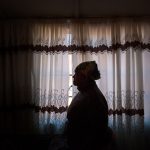The lives of Ekurhuleni’s nyaope users
Trauma is often the gateway ‘drug’ that puts young South Africans on the path to nyaope addiction, and addiction carries a high price for them and their families.
Author:
27 August 2019

“I am married to nyaope, nyaope is my bride. I can’t just quit,” says a scrawny Wandile Mdlalose, 24, his voice raised for emphasis. He speaks as he loosens his grip on a piece of blue cloth he has tied around his right arm to find a vein.
After mixing water with nyaope in a syringe, he tightens the grip on his arm again, easing the needle in and drawing blood before injecting the precious liquid back into the vein. He explains that he dilutes his blood with water because blood is thick.
Nyaope is a low-grade form of heroin. It is sold in a small piece of plastic called a “tie” because of how it is fastened.
Angela McBride, the executive manager of the South African Network of People Who Use Drugs says trauma is the gateway “drug”. “People use drugs to cope with their trauma. Getting high is the only thing that is comforting,” she says. A self-admittance study from 2015 revealed that 67 000 people inject heroin.
Related article:
With a R200 daily spend on nyaope, Mdlalose is aware of how difficult it will be to beat the cravings. He’s been addicted for 10 years, but he wants to quit to provide for his 11-year-old daughter.
“I’m doing nothing except nyaope … this thing makes you naughty, you do the wrong things to community members and they turn on you,” he says, removing his camouflage cap to reveal a scar on his head, burn marks on his cheek and a freshly bloodied eye. He speaks of the easy solution of crime for nyaope addicts: “We want quick money to feed this thing.”
He started smoking nyaope unaware that he would end up addicted to it, just like the other men who use the derelict toilets in Mayfield Ext 45 in Ekurhuleni.

Rubbish foragers
Early on a Saturday morning, a group of young men covered in soot, soil and ash scratch through a heap of rubbish just outside a scrapyard in Ekurhuleni.
The glazed, yellowed eyes of Simphiwe Gambu, 22, narrow as he holds up a rusty piece of copper between his dirty nails for scrutiny before throwing it into half an empty two-litre Coke bottle. A kilogram of good scrap metal can earn him R40. A “tie” of nyaope costs R25.
Related article:
The young men are determined to find enough scrap metal to feed their addiction. Gambu says he needs at least R100 a day to keep his insatiable cravings at bay.
“We open at 7am, but you will find these boys here at 6am because of this thing. They must just go to rehab,” says the woman who weighs their scrap metal, often rejecting it if they give her attitude.
After acquiring his first “tie” for the day, Gambu laughs with his dealer. He goes to the tuckshop to buy a cigarette – something he says is crucial to kicking in his high – before impatiently searching for an empty toilet stall to smoke in. He is distracted by his pain, eager to relieve his morning pangs.
Smoking nyaope
Gambu uses a razor blade to pick up a small bit of nyaope, a cream-coloured powdery substance, that he drops on to a piece of dirty foil and lights up. Using an old rolled up matchbox, he inhales the vapour and holds his breath before quickly lighting up his cigarette and inhaling deeply.
“When people use drugs, their resistance builds up, especially [against] opioids … [Nyaope] is a very strong drug, people do become very dependent on it very quickly,” says McBride, explaining that three out of five people graduate from inhaling nyaope to injecting it.
The men hustle differently. Some recycle goods, some help with groceries or parking for coins, others find piecework. “The craving can get so bad you can end up doing something hurtful and unthinkable to someone you love. You just don’t think,” says Gambu, explaining that he resorts to theft when his cramps and cravings become unbearable.
Related article:
The men understand the variation in needs that differ and change at each stage of craving. The aim is to get high before the dreaded “rost”, which they all describe as an unbearable craving that may include excruciating pain in the lower back, joints and muscles, intense stomach pangs and vomiting blood.
Gambu says this is the feeling that will make anyone do anything for the next fix. He started off with “skyf skyf” (cigarettes). By the time he was in grade 10, he had graduated to weed. He dropped out of Lesiba Secondary School last year when it became difficult for him to concentrate at school and he needed the time to rummage for money for his next fix.
Like Mdlalose, what began as two pulls led him to a point where he oscillates between being high and being desperate for a fix. Almost every man in the cramped toilet did not finish school. They are all unemployed.

Ruling out rehab
Rehab is possible for nyaope addicts, McBride explains, adding that there are no government-run systems in place to ensure people recover or to provide aftercare service. She says there are hardly any opioid substitution programmes.
Some private services provide methadone (a prescription medication used for heroin recovery), shelter and psychosocial services, she says. Mdlalose has approached a social worker, who told him there is a three-month waiting list for a rehab consultation. This has made him despondent about the possibility of quitting.
“There is hope. If we look at where we were five to seven years ago, we have made progress. We now have needle-syringe programmes, we have opioid substitution therapy programmes … we have people who are fighting our current drug policies,” says McBride.
Related article:
Bongani Mahlangu, 23, says his mother usually gives him R20 a day in exchange for not stealing at home. “I am usually very proud of myself if I survive the whole day at home. This craving is difficult though, it will make you leave home even if you had no plans to because it’s so strong. You cannot function without it, something as small as opening the door can feel so hard,” he adds.
A week later, Mahlangu is arrested for stealing from his neighbour.
Last year, Gambu’s family bought him methadone to try and get him to stop using nyaope. But it didn’t work. Within days, he had relapsed. He thinks his family is aware he is back on nyaope.
The family of Luvuyo Khumbuza, 26, had him forcefully admitted to a local “recovery church”. “It was torture there … I would rather go back to prison than go there,” he says, smoke enveloping the fading green tattoos on his skin.
He describes how he was locked in chains, and how they had their systems forcibly cleaned out with enemas and emetics. He did not receive any pain medication.
Related article:
Thokozani Mngeni, 30, who was also in a “recovery” church until he escaped, explains that the pain he experienced there was unbearable and he could not stand the place’s unhygienic conditions.
McBride knows about the existence of these churches, describing them as the “epitome of how badly people who use drugs are treated”.
Mngeni has two children and used to work as a security guard at a mall. He lost his job because of nyaope, and moved to the Eastern Cape to try and quit. He returned to Gauteng a few months later. The first thing he did was steal a cellphone to sell for a fix as there were no recreational distractions or employment prospects, and he was stuck with the same crowd, making it harder to quit.
Broken families
Above all, the young men miss being trusted, and not only by their families. They acknowledge the pain they have caused their loved ones as well as the terror they have sometimes unleashed.
Mahlangu explains what his drug addiction has done to his mother: “She stays indoors most of the time to avoid comments from neighbours, who whisper that her son is a nyaope [addict] and a troublemaker.”
Sphiwe Ndlovu, 22, has a strained relationship with his parents, who he says do not understand how difficult it is to quit the drug. He lives with his brother. “[My brother] locks his bedroom door so I am only limited to the toilet, kitchen and my room.”
The monotony is the killer for Ndlovu: “Every day, we do the same thing. It is like we have nothing to live for except this thing … Every day, we come and smoke in the toilets away from the community,” he says.
The men say some nyaope users have given themselves over completely to the drug. When that happens, Ndlovu explains, “you look like you have been hit by a nuclear bomb” but they say they want to quit before they reach this stage.





